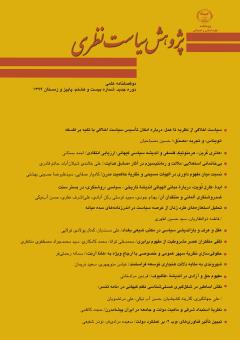حقوقیسازیِ نظریۀ سپهر عمومی و خصوصی با ارجاع ویژه به «هانا آرنت»
محورهای موضوعی : Research in Theoritical Politics
1 - استادیار گروه حقوق، واحد همدان، دانشگاه آزاد اسلامی، همدان، ایران
کلید واژه: احزاب, جامعه مدنی, حقوق خصوصی, حقوق عمومی و خانواده. ,
چکیده مقاله :
تطبیقِ نظریهِ سیاسیِ سپهر عمومی و خصوصی با علم حقوق، مبنایی برایِ تحدید حقوق و دولت و تدقیق مرز حقوق عمومی و خصوصی می دهد. روش پژوهش، توصیفی-تحلیلی است؛ به این ترتیب که نخست، سپهر خصوصی و سپهر عمومی با لحاظِ آرایِ هانا آرنت، از طریق شناساییِ مؤلفه ها توصیف میشود و دوم، مؤلفه هایِ دو حوزه در انطباق با چارچوب حقوق و شاخه هایِ آن در حالت کلی، به ویژه حقوق عمومی و خصوصی تحلیل شده، در نهایت میزان به رسمیت شناخته شدنِ سپهر خصوصی و عمومی در حقوق ایران سنجیده می-شود. سپهر خصوصی، عرصه ای از زندگیِ انسان است که با اوصافی مانندِ مالکیتِ غیر منقول و ریاست خانواده گره خورده و تمایل بر پوشیدگی و تبعاً ناحقوقی سازیِ آن است. جامعه مدنی بخشی از سپهر خصوصی و عرصۀ فعالیت خودبنیادِ انسانی در قالب گروه هایِ مستقل از دولت است. سپهر عمومی، عرصه ساختنِ سیاست توسط شهروندان، از طریقِ گفت و گو و فعالیت است. در وضع موجود نظام حقوقی ایران، کلیتِ چارچوب سپهر خصوصی، مورد حمایت قانون-گذار است. جامعه مدنی تلویحاً به رسمیت شناخته شده است، ولی استقلال آن از دولت تضمین نشده است. سیاست را دولت می سازد و شهروندان در چارچوب آن با کسب مجوز از دولت فعالیت می کنند.
The comparative study on political theory of the public and private sphere with law provides a basis for restriction of law and state and redraws public-private law boundary. Research method is descriptive-analytical. That is, firstly, the private and public sphere, according to Hannah Arendt's theories, are described by identifying its elements. And, secondly, the elements in two spheres are analyzed in accordance with law framework and its branches generally. And, finally, the level of recognition of private and public sphere in legal system of Iran is measured. The private sphere is an area of human life that is intertwined with elements such as intangible ownership and presidency of the family, and the tendency to conceal and naturally de-legalization. Civil society is a part of private sphere; it is an area of human self-control activity into non-governmental groups. The public sphere is an area of policy-making by citizens through free conversation and action. In the legal system of Iran, the private sphere is supported overall; independence of civil society is not guaranteed, despite implicit recognition. Government makes policy, then citizens work within its framework after getting governmental permission.
